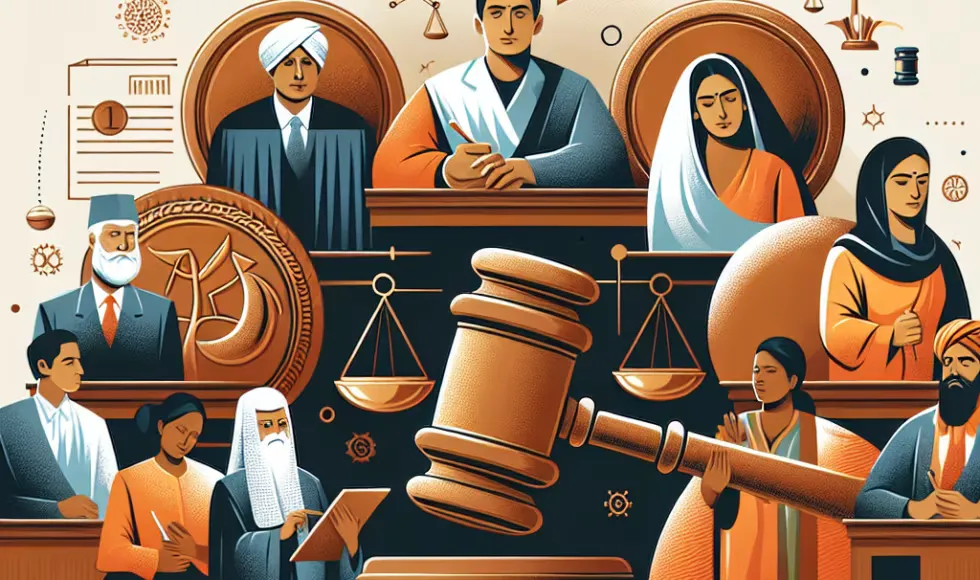In the fast-paced world of legal disputes, the traditional court system can often seem daunting and time-consuming. However, in India, there exists an alternative mechanism known as Lok Adalat, which aims to provide a quicker and more amicable resolution to disputes. This article delves into the concept of Lok Adalat, its significance in the Indian legal framework, and how it functions to benefit litigants.
What is Lok Adalat?
Lok Adalat, which translates to "People's Court," is a forum established under the Legal Services Authorities Act of 1987. It serves as an alternative dispute resolution mechanism that allows parties to resolve their disputes amicably without resorting to lengthy court procedures. The primary objective of Lok Adalat is to reduce the backlog of cases in courts and provide speedy justice.
The Legal Framework of Lok Adalat
Lok Adalats operate under the following legal provisions:
- Legal Services Authorities Act, 1987: This act provides for the establishment of Lok Adalats at various levels across India.
- Section 19: It empowers the Lok Adalat to settle disputes amicably and make awards that are binding on both parties.
- Constitutional Provisions: Article 39A of the Indian Constitution mandates free legal aid and promotes justice on a basis of equal opportunity.
The Structure of Lok Adalat
Lok Adalats are typically organized by:
- District Legal Services Authorities (DLSAs): These bodies are responsible for organizing Lok Adalats at the district level.
- High Courts: They also conduct Lok Adalats for cases pending before them.
- Suo Motu Initiatives: Sometimes, judges may initiate a Lok Adalat for specific cases based on their discretion.
The Process of Lok Adalat
The process followed in a Lok Adalat is straightforward and user-friendly:
- Filing a Case: Parties interested in resolving their disputes can approach the DLSA or any other authorized body to file their case for consideration in a Lok Adalat.
- Notice Issuance: Once a case is filed, notices are sent to both parties informing them about the date and venue of the Lok Adalat.
- Mediation Session: During the session, trained mediators facilitate discussions between parties to help them arrive at a mutually acceptable solution.
- Award Issuance: If an agreement is reached, it is documented as an award. This award has the same status as a decree passed by a civil court.
The Advantages of Lok Adalat
The advantages of opting for Lok Adalat over traditional litigation are numerous:
- Speedy Resolution: Cases in Lok Adalats are resolved much faster than those in regular courts due to less formal procedures.
- No Court Fees: There are no fees involved in filing cases in Lok Adalats, making it accessible for all sections of society.
- Mediation Focused: The emphasis on mediation encourages amicable settlements rather than adversarial confrontations.
- Binds Parties Legally: The awards given by Lok Adalats are legally binding and enforceable like any court decree.
Certain Limitations of Lok Adalat
While there are many benefits associated with Lok Adalats, some limitations should be acknowledged as well:
- Narrow Scope: Not all types of disputes can be referred to a Lok Adalat; certain matters such as serious criminal cases may not qualify.
- Lack of Precedent Value: Awards made by Lok Adalats do not create binding precedents for future cases.
- Plethora of Cases: In some regions, there may be too many cases being referred to Lok Adalats, leading to rushed resolutions that may not always serve justice effectively.
A Case Study: Successful Resolution through Lok Adalat
A notable example highlighting the efficacy of Lok Adalats occurred in Mumbai in 2020 when over 1,000 pending motor accident claims were settled within just one day during a special session. The involved parties were able to negotiate settlements that were satisfactory for both sides without enduring prolonged litigation. This case exemplifies how effective and efficient these forums can be when properly utilized.
The Role of NyayGuru in Promoting Awareness about Lok Adalat
The advent of technology has further enhanced access to legal information. Platforms like NyayGuru play a crucial role in educating individuals about alternatives like Lok Adalat. By providing resources and guidance through AI-driven chatbots trained on Indian laws, NyayGuru assists users in understanding their rights and options available under various legal frameworks including dispute resolution through Lok Adalats. This empowers individuals with knowledge about how they can seek justice efficiently and effectively.
Conclusion: Embracing Alternative Dispute Resolution
The concept of Lok Adalat embodies the spirit of justice by making it accessible and affordable for all citizens. With its focus on mediation and speedy resolution, it serves as an invaluable tool within India's legal landscape. While there are limitations that need consideration, its advantages far outweigh them when seeking timely justice. As awareness grows through platforms like NyayGuru, more individuals will likely turn towards this effective alternative dispute resolution mechanism.


